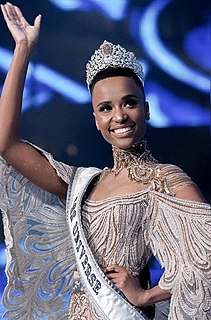A Quote by Noam Chomsky
By 1960, the South Africans knew that they were becoming a pariah state.
Related Quotes
After the Moslem Africans lost control over Spain, they began to prey on the Africans further to the south. They destroyed the great independent states in West Africa, and subsequently set Africa up for the Western slave trade and the Arabs were in the slave trade before Islam and they are still in the slave trade.
The first election in which all South Africans took part was in April, 1994. There were long queues [lines] of employers and employees, black and white. In the sense of Africans, Coloreds and Indians - when I talk about blacks, I mean those three. Blacks and whites mingled to vote without any hitches. Many people would have expected a great deal of tension, clashes and violence, but it did not occur.
The time will come when our nation will honour the memory of all the sons, the daughters, the mothers, the fathers, the youth and the children who, by their thoughts and deeds, gave us the right to assert with pride that we are South Africans, that we are Africans, and that we are citizens of the world.
I have dear friends in South Carolina, folks who made my life there wonderful and meaningful. Two of my children were born there. South Carolina's governor awarded me the highest award for the arts in the state. I was inducted into the South Carolina Academy of Authors. I have lived and worked among the folks in Sumter, South Carolina, for so many years. South Carolina has been home, and to be honest, it was easier for me to define myself as a South Carolinian than even as an American.
We do not have a South African as a member of the African Commission. The President of the Commission comes from Mali, the Deputy comes from Rwanda and then we have got all these other members, ordinary commissioners. There is no South African there. And the reason, again, for that is not because we didn't have South Africans who are competent.
There is an absence of democratic accountability and control in every sphere of government and the state. To address this debilitating legacy requires determined action and a deep commitment to transforming our society from a crisis ridden present into something all South Africans can be truly proud of.


































